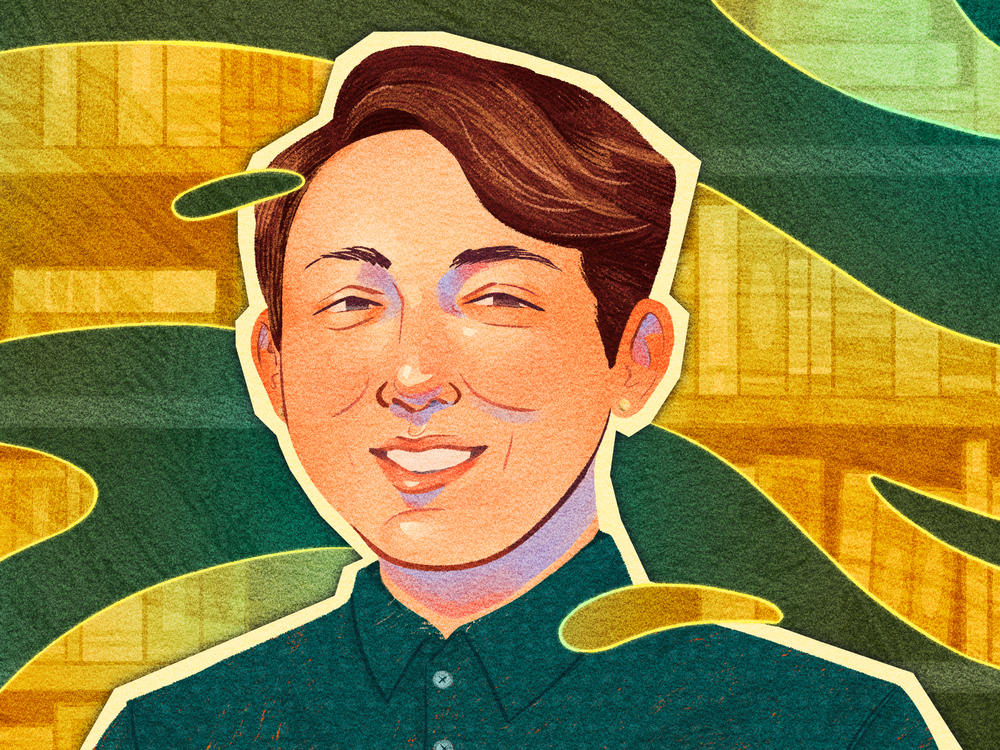Section Branding
Header Content
Author Maia Kobabe: Struggling kids told me my book helped them talk to parents
Primary Content
This essay by Maia Kobabe is part of a series of interviews with — and essays by — authors who are finding their books being challenged and banned in the U.S.
In mid-2018 I showed a partial draft of Gender Queer: A Memoir, my first full length book, to my writing group. One fellow cartoonist, Jimmie Robinson, said, "Get ready for this book to be challenged, and take it as a compliment when that happens." Robinson is the author of a dark political satire series that shows a villainous, mostly nude, main character facing off with heroes and a certain former president. He was very well familiar with people misunderstanding and misinterpreting his work. He added, "Maybe go make some friends at the Comic Book Legal Defense Fund now."
I was obviously already aware that queer, trans, and nonbinary narratives often receive pushback. I did brace myself, in 2019 when the book was released, for a certain amount of negative attention online, if not a full-on wave of internet hate. But it didn't come. Instead, Gender Queer was met with a wave of online love.
The first print run (just 5,000 copies) sold out the week the book was released. As I toured six states and numerous bookstores in 2019, I received only positive, often heartwarming and deeply moving, feedback. People told me they related to Gender Queer more than any other book they'd ever read. They told me it made them feel less alone. They told me they had shared the book with a parent, or a partner, or a friend, and it had opened up conversations they'd never been able to have before.
In 2020, Gender Queer was given two awards by the American Library Association (ALA): a Stonewall Honor, and an Alex Award, which recognizes books published for adults that hold crossover appeal for readers "aged 12 to 18." We headed into a second printing, then a third, then a fourth. By the time covid shut down my comic convention touring, the book had been out for long enough that it was starting to get assigned in college classes. I spent much of 2020 and 2021 speaking via zoom to literature classes, gender studies classes, comic classes, and once a class on graphic medicine, a study of narratives of health and illness in comic form. I settled into the business of writing my second book, happy that my first one had been so well received.
And then, fall of 2021. A video of a parent railing against Gender Queer in a school board meeting in Fairfax, Virginia went viral and sparked an immediate series of copy-cat challenges elsewhere. Sometimes the challenges were overturned, and the book was returned to the library shelves. Other times the book was banned and removed. Several conservative politicians made book banning a major talking point of their campaigns. There were so many challenges in such quick succession before the end of the year that I literally could not keep track of them all. I was getting so many interview requests that I could easily have turned into a full-time public speaker with no time to write.
In spring of 2022, the ALA announced that Gender Queer was the most challenged book of the previous year, taking the top spot from another book about a trans young person written by a nonbinary author, Alex Gino's Melissa. Very shortly after this, another Virginia Republican sued Barnes and Noble claiming that my book was "obscene." I thought, then, of Jimmie Robinson's advice from four years earlier. The Comic Book Legal Defense Fund is a nonprofit organization dedicated to the protection of the First Amendment rights of the comics art form and its community of retailers, creators, publishers, librarians, and readers. I was incredibly grateful when they reached out to me, and offered to represent my book in the case. They supported me all summer, while the hearing was delayed again and again. Finally, in August, the case was dismissed by a judge as unconstitutional.
I am trying, as Robinson advised, to take all of this as, if not a compliment, at least a kind of testament to the strength of my work. Being the author of a heavily challenged book is stressful, and it wastes a lot of my time – but it puts me in very good company. I never expected my book to sit on lists beside Beloved, To Kill A Mockingbird, The Hate U Give, Speak, and Of Mice and Men. It still feels vaguely surreal, and I'm sure I haven't processed the ripple effects I will feel for the entire rest of my career. For now, I am strengthening my commitment to continue writing stories centering trans, queer, and nonbinary characters. Certain parts of the country may be fixated on censoring me, but I will not be censoring myself.
Maia Kobabe is the author of the memoir Gender Queer and a number of short comics that have been published in The Nib, The New Yorker, The Washington Post, and several anthologies. You can find Maia here.
Copyright 2023 NPR. To see more, visit https://www.npr.org.

